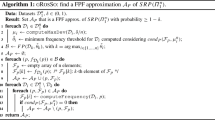Abstract
This paper presents a proposal of distribution’s estimated algorithm to the extraction of sequential patterns in a database which use a probabilistic model based on graphs which represent the relations among items that form a sequence. The model maps a probability among the items allowing them to adjust the model during the execution of the algorithm using the evolution process of EDA, optimizing the candidate’s generation of solution and extracting a group of sequential patterns optimized.
Access this chapter
Tax calculation will be finalised at checkout
Purchases are for personal use only
Preview
Unable to display preview. Download preview PDF.
Similar content being viewed by others
References
Agrawal, R. e Srikant, R. “Mining Sequential Patterns”. In Proc. of 1995 International Conference Data Engineering, Taipei, Taiwan, March, (1995).
Agrawal, R. e Srikant, R. Fast. “Algorithms for Mining Association Rules”, In: Proc. 20th International Conference Very Large Data Bases, VLDB, (1994).
Baluja, S. e Caruana, R. “Removing the Genetics from Standard Genetic Algorithm”. In Proceedings of the International Conference on Machine Learning. Morgan Kaufmann. p. 38-46, (1995).
Fogel, D. “Evolutionary Computation: Toward a new Philosophy of Machine Intelligence”. 2ª Ed., IEEE Press, 312p, (2000).
Han, J.; Kamber, M. “Mining Sequence Patterns in Trasactional Databases. In: Data Mining: Concepts and Techniques”. 2. ed. San Francisco: Elsevier. p. 23-498, (2006).
Holland, J. “Adaptation in Natural and Artificial Systems. University of Michigan Press”, Ann Arbor, (1975).
Kantardzic, M. “Data Mining Concepts. In: Data Mining: Concepts, Models, Methods and Algorithms”. New York: IEEE Press, (2003).
Koza, J. R. “Genetic Programming: On the Programming of Computers by Natural Selection”. MIT Press, Cambridge, (1992).
Larose, D. L. “Introduction to Data Mining. In: Discovering Knowledge in Data”. New Jersey: Wiley, (2005).
Larrañaga, P. e Lozano, J. “Estimation of Distribution Algorithms: A new tool for Evolutionary Computation”, Kluwer Academic Publishers. 382p, (2002).
Muhlenbein, H. e PaaB, G. From recombination of genes to the estimation of distributions I . Binary parameters, Lecture Notes in Computer Science 1141: Parallel Problem Solving from Nature - PPSN IV, pp.178-187, Springer, (1996).
Pei, J., Han, J., Pinto, H., Chen, Q. e Dayal, U. “PrefixSpan: Mining Sequential Patterns Efficiently by Prefix-Projected Pattern Growth”. Int. Conf. on Data Engineering, (2001).
Sakura, S.; Kitahara, Y.; Orihara, R. “A Sequential Pattern Mining Method based on Sequential Interestingness”. International Journal Of Computational Intelligence, Paris, p. 252-260. (2008).
Santana, R., Larrañaga, P. e Lozano, J. “Interactions and Dependencies in Estimation of Distribution Algorithms”. IEEE Press, 1418-1425, (2005).
Spence, Robert. Information Visualization. Barcelona: Acm Press, 459 p., (2001).
Srikant, R. e Agrawal, R. (1996) “Mining Sequential Patterns: Generalizations and Performance Improvements”. Proc. 5th EDBT, 3-17.
Zaki, M., J. “Spade: An Efficient Algorithm for Mining Frequent Sequences”. Machine Learning 42, ½, 31-60, (2001).
Zhao, Q. e Bhowmick, S. “Sequential Pattern Mining: A Survey”. Technical Report, CAIS, Nanyang Technological University, Singapore, No. 2003118, (2003).
Zhigljavsky, A. Theory of Global Random Search. Kluwer Academic Publishers, (1991).
http://www.ics.uci.edu/˜mlearn/. Acessado em: 24/10/2009.
Author information
Authors and Affiliations
Corresponding author
Editor information
Editors and Affiliations
Rights and permissions
Copyright information
© 2010 Springer Science+Business Media B.V.
About this paper
Cite this paper
Godinho, P.I.A., Meiguins, A.S.G., de Oliveira, R.C.L., Meiguins, B.S. (2010). An Estimation of Distribution Algorithms Applied to Sequence Pattern Mining. In: Sobh, T., Elleithy, K. (eds) Innovations in Computing Sciences and Software Engineering. Springer, Dordrecht. https://doi.org/10.1007/978-90-481-9112-3_102
Download citation
DOI: https://doi.org/10.1007/978-90-481-9112-3_102
Published:
Publisher Name: Springer, Dordrecht
Print ISBN: 978-90-481-9111-6
Online ISBN: 978-90-481-9112-3
eBook Packages: Computer ScienceComputer Science (R0)





